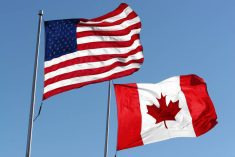A former ambassador to China says Canada could send a message by slowing down inspections of imported goods
A former Canadian ambassador to China says Canada needs to retaliate against the ban on canola exports, but it has to be a measured response.
David Mulroney, who was ambassador from 2009-12, used a hockey analogy to describe the situation.
“Goalies don’t let people skate through the crease,” he said.
“China is skating through the crease here, and we need to whack them. We need to show them they’ve gone too far and that we will respond.”
He doesn’t believe Canada should place tariffs on China’s exports to Canada or ban them altogether as China has done.
Read Also

Farming Smarter receives financial boost from Alberta government for potato research
Farming Smarter near Lethbridge got a boost to its research equipment, thanks to the Alberta government’s increase in funding for research associations.
“It can sound very tame and weak-willed, but because we’re a market economy and a democracy, we have to be very careful that China doesn’t simply respond and more Canadian exporters get hurt,” said Mulroney.
“China is so heedless, and can take so much more punishment than we can.”
What he thinks Canada should be doing is slowing the inspection process on incoming Chinese products that have had quality and safety issues in the past, such as toys, tools and building materials.
“I wouldn’t make a big public deal about this, but the Chinese would get the message,” said Mulroney, who is a senior fellow with the Munk School of Global Affairs at the University of Toronto.
He would postpone implementation of the delaying tactics until a recently announced Canadian delegation led by the president of the Canadian Food Inspection Agency has completed its work in China.
If the team determines that the science-based discussions are a farce and there is no good-faith process that can address China’s concerns in a reasonable time frame, then the delay tactics should be put in place.
Mulroney also believes Canada should immediately launch a World Trade Organization challenge over China’s actions.
“They are sensitive to the publicity that that brings,” he said.
China has repeatedly targeted canola because agriculture is the only sector of the Canadian economy that has a trade surplus with China.
The Chinese often cite concerns over blackleg disease. The issue surfaced in 2009, 2013 and again in 2016.
It is one of the pests mentioned in the current dispute, despite the fact the two countries have a memorandum of understanding on how to prevent the spread of the disease.
Mulroney said it is important that Canada doesn’t just keep taking it on the chin on canola without fighting back.
“We have to discourage them from making canola their product of choice every time they want to give Canada a hard time,” he said.
The irony is that China needs Canada’s canola and many other food products over the long run because demand in the country is growing while production is constrained by polluted farmland and a lack of fresh water.
“What’s really weird about this is China should be absolutely petrified about food security. They should be cultivating good relationships,” said Mulroney.
China has to tread carefully because while it is a massive market for agricultural products, it isn’t the only one.
That’s why he believes Canada should immediately announce export assistance for the canola sector in the form of trade missions to open up new target markets.
He would have Prime Minister Justin Trudeau lead the first mission to a series of countries deemed most likely to increase their purchases of Canadian canola.


















